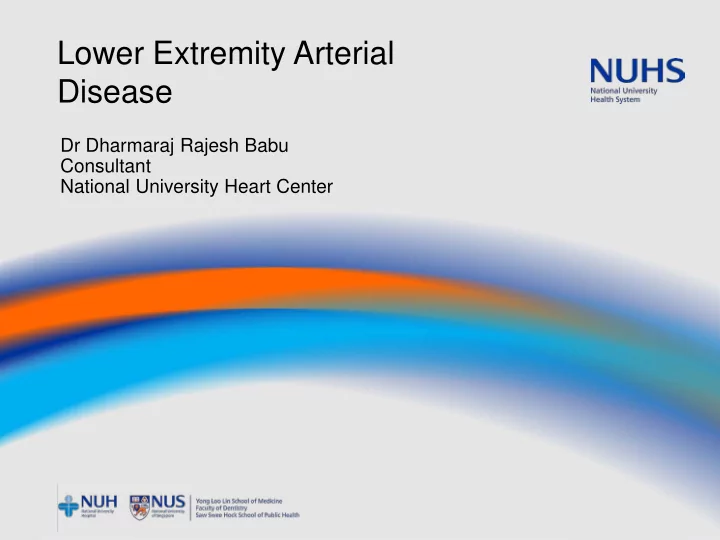

Lower Extremity Arterial Disease Dr Dharmaraj Rajesh Babu Consultant National University Heart Center Topic and date goes here 1
Introduction Epidemiology Natural History Diagnosis Management Topic and date goes here 2
Introduction Topic and date goes here 3
Introduction Chronic lower limb ischemia secondary to peripheral arterial disease is most common limb pathology seen by vascular specialist Due to increasing age, increasing prevalence of DM and other risk factors the prevalence is on the rise Patient present with asymptomatic disease, intermittent claudication, rest pain, or tissue loss Topic and date goes here 4
Epidemiology Topic and date goes here 5
Epidemiology Best method of assessing the prevalence is to record the ABI and correlate it with risk factors ABI less than 0.9 and higher than 1.4 is abnormal ABI correlated well with the mortality risk associated with PAD, regardless of whether leg symptoms are present Overall prevalence is 4.3% Topic and date goes here 6
Epidemiology Topic and date goes here 7
Prevalence based on risk factors Hypertension increases risk by 2.5 fold PAD prevalence is 20% to 30% higher in DM Severity of arterial occlusive is proportional to number of cigarettes smoked Topic and date goes here 8
Odds ration for risk factors for symptomatic PAD Topic and date goes here 9
Natural History Topic and date goes here 10
Natural history Topic and date goes here 11
One year outcomes Topic and date goes here 12
Diagnosis Topic and date goes here 13
Diagnosis Complete History and detailed physical examination Classical Risk factors and less commonly associated risk factors should be identified and defined Diagnostic tests Topic and date goes here 14
Diagnostic Studies Exclusion of Cardiac and Vascular Hematological other associated cerebrovascular laboratory and investigations pathology like Evaluation imaging studies aneurysm Topic and date goes here 15
Hematological Studies Fasting Blood Full blood count Serum creatinine Sugar Fasting Lipid Hypercoagulable Homocysteine profile states Topic and date goes here 16
Vascular Laboratory ABI Toe Pressure tcPO2 Exercise ABPI Ultrasound Duplex Topic and date goes here 17
Imaging CT Angiogram MR Angiogram Conventional Angiogram Topic and date goes here 18
Treatment Control Cardiovascular Risk factors Specific therapies Topic and date goes here 19
Control Cardiovascular Risk Factors Smoking Diabetes mellitus Hypertension Dyslipidemia Platelets and Thrombosis Homocysteinemia Topic and date goes here 20
Smoking Smoking cessation has been shown to reduce the risk of MI and death in patients with pad and delay the progression of lower extremity symptoms from claudication to CLI and Limb loss Three fold increased risk of graft failure in smokers Topic and date goes here 21
Smoking Cessation Education Education Emotional Support Emotional Support Pharmacological aids Pharmacological aids Topic and date goes here 22
Smoking Cessation Bupropion Varenicline Topic and date goes here 23
Diabetes Mellitus 1% increase in glycosylated hemoglobin is associated with 28% increase in risk of PAD DM leads to alteration in nitric oxide availability and stimulation of proatherogenic activity in vascular smooth muscles DM enhances platelet aggregation=n, increased blood viscosity and elevation of fibrinogen levels Topic and date goes here 24
Diabetes Mellitus American Diabetes association guidelines recommend hemoglobin A1c levels less than 7% Goal should be maintain glucose control close to normal without significant hypoglycemia Topic and date goes here 25
Hypertension 2 to 3fold increased risk of PAD Target blood pressure of 140/90 mmHg in high risk groups Target bloos pressure of 130/80 mm Hg in patients who also have Dm or renal insufficiency Topic and date goes here 26
Dyslipidemia Total Serum cholesterol levels greater than 5.18 mmol/l are associated with an increased risk of cardiac related events, especially in combination with a low HDL fraction Statins have lipid lowering properties Statins also works by stabilizing existing atherosclerotic plaques, decreasing oxidative stress and reducing vascular inflammation Statin also protects against thrombosis by altering the lipid content of platelets, thereby decreasing platelet aggregability Topic and date goes here 27
Platelets and thrombosis Antiplatelet therapy reduces the risk of non fatal MI, ischemic stroke and vascular related death Asiprin, Clopidrogrel and newer drugs are available All patients with diagnosed PVD should be started on antiplatelets. No evidence of it in patients at-risk Topic and date goes here 28
Claudication Exercise Therapy Pharmacologic treatment Revascularization in disabling claudication Topic and date goes here 29
Pharmacological treatment Pentoxifyline Cilostazol Topic and date goes here 30
Critical lower limb ischemia Need tertiary care Control of risk factors Revascularization and debridement Topic and date goes here 31
Thank You Topic and date goes here 32
Recommend
More recommend